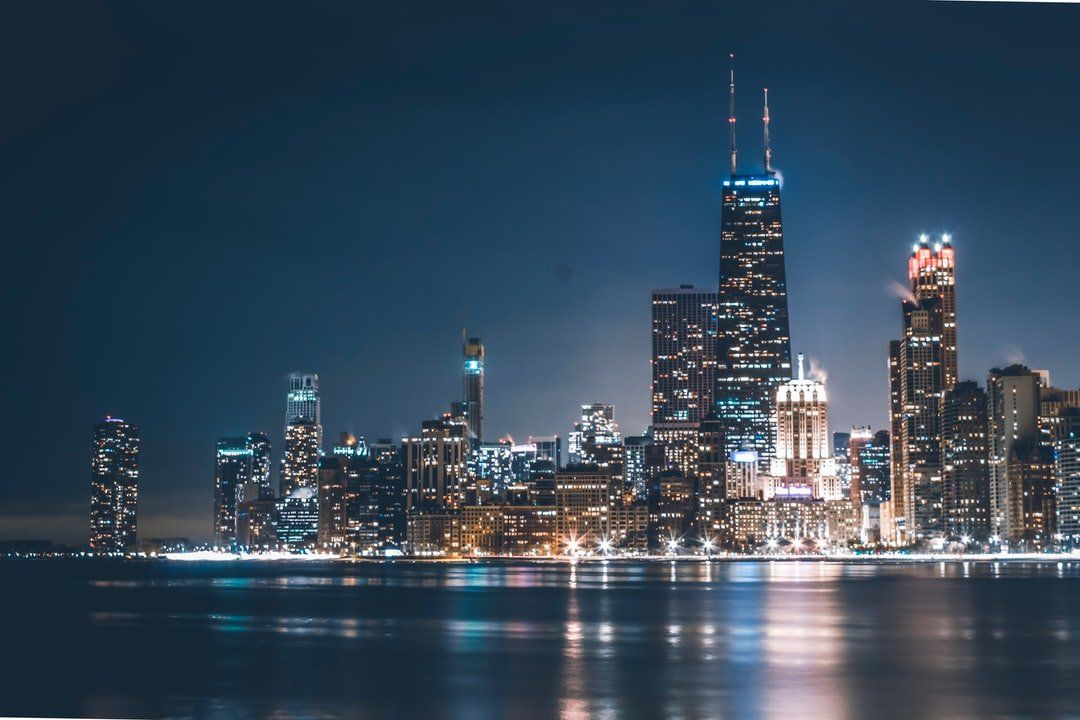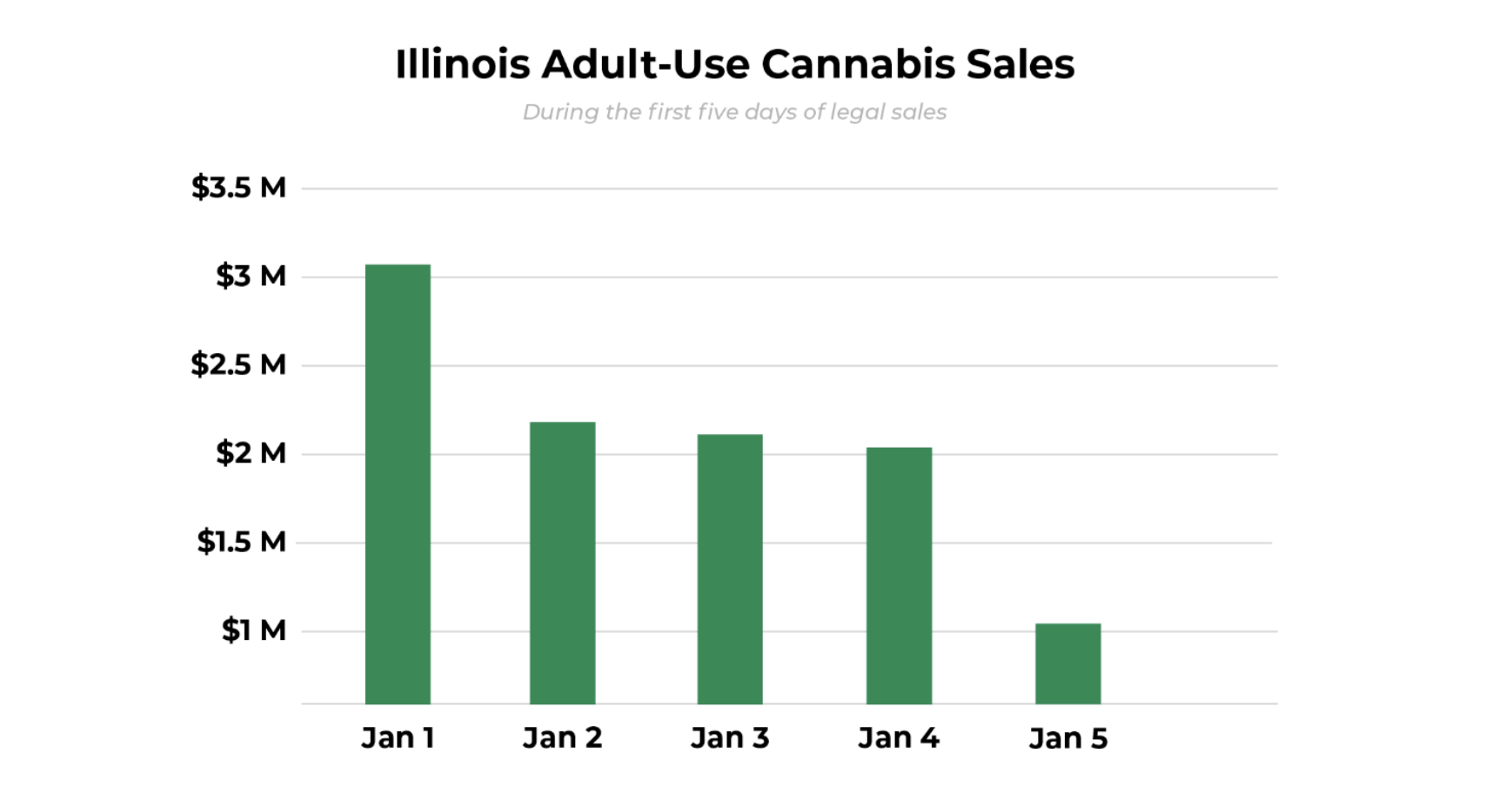Blog Layout
Illinois Recreational Cannabis Market: New License Applications Available for Craft Growers, Infusers, and Transporters
Last Updated on Jan 22, 2020
The 21 licensed medical cannabis cultivation centers in Illinois were allowed to apply for early approval licenses to cultivate for the recreational market. All 21 cultivation centers
completed the application and were approved to supply the recreational market, with the final two applicants receiving their licenses on December 23, 2019. These cultivation centers are now the sole producers for the state’s medicinal and recreational cannabis markets.
Contact Us
In Illinois’ recent dispensary application process, over 700 applications were submitted for 75 dispensary licenses, of those received by the state more than 600 qualified as social equity applicants. 50 of the 250 possible points on the dispensary applications were awarded to social equity applicants. Outside of social equity status, the state’s grading focused heavily on the business plan, financials, operating plan, floor plan, security, record keeping, and cannabis-specific knowledge and experience. Such a highly competitive application process demands that teams are highly qualified and put in the work to differentiate themselves in the application’s narrative. The process was complicated and required meticulous attention to detail to correctly articulate the company’s plans and team qualifications. We learned a great deal about how to handle social equity applicants, (include other, deep findings from our work in the process here). For those who submitted their new entrant adult-use dispensary applications by the January 2, 2020 deadline, licenses will be awarded in the coming months, and businesses are anticipated to open by May 2020. The pressure is on for the 21 cultivation centers to quickly scale their operations and prepare for these new dispensaries.
Demand for recreational cannabis in Illinois is likely to outweigh supply
for at least the first year. With the next round of licenses for adult-use Cultivation Centers slated for July 2021, a new category of cultivator called a Craft Grower will be issued licenses by July 2020, to help bolster the supply from the current Cultivation Centers. Craft Grower licenses are limited to a flowering canopy size of 5,000 sq.ft. from the start, but upon approval by the state, they can increase their production in increments of 1,000 sq.ft. based on the needs of the market and the company’s track record of compliance, until a maximum of 14,000 sq. ft. We expect the Craft Grower license process to be just as detailed, demanding, and competitive as this past round of dispensary license applications. Contact 3C if you would like to hear our thoughts on handling this application process.
Despite opening struggles, the pay off for getting in on Illinois’ adult-use cannabis market will be well worth the initial supply stall. Marijuana Business Daily predicts that the state’s adult-use sector alone could eventually reach $2.5 billion
in annual sales.
Now is a once in a lifetime opportunity to secure one of the first Craft Grower, Infuser, or Transporter licenses in Illinois. The Illinois Department of Agriculture
just released applications on January 7, 2020, for these license types. Here are some of the highlights for each license type:
Craft Growers
- As defined by the Cannabis Regulation and Tax Act, a Craft Grower is “a facility operated by an organization or business that is licensed by the Department of Agriculture to cultivate, dry, cure, and package cannabis and perform other necessary activities to make cannabis available for sale at a dispensing organization or use at a processing organization.”
- Applications will be accepted beginning February 14, 2020, and due by 5:00 PM CST on March 16, 2020.
- 40 craft grower licenses are available for this round, with an additional 60 licenses to be issued on December 21, 2021.
- Must submit a non-refundable application fee of $5,000 or, if the applicant qualifies as a Social Equity Applicant, a non-refundable application fee of $2,500.
- Applications will need to be submitted in person, either in Springfield or Chicago.
- Authorized to cultivate between 5,000 and 14,000 square feet of flower canopy.
- Prohibited from locating within 1,500 feet from another Craft Grower or Cultivation Center.
- Just like the Dispensary licenses, 20% of the possible points are reserved for qualified social equity applicants.
- Detailed documentation is required for each principal officer, and anyone with a financial or voting interest of 5% or more must be identified on the application.
- Review the Craft Grower application here.
Application Scoring Criteria (1,000 Total Points)
- Suitability of the Proposed Facility (75 points)
- Suitability of Employee Training Plan (50 points)
- Security Plan and Record-keeping (145 points)
- Cultivation Plan (75 points)
- Product Safety and Labeling Plan (95 points)
- Business Plan and Services to be Offered (110 points)
- Applicant’s Status as a Social Equity Applicant (200 points)
- Applicant’s Labor and Employment Practices (20 points)
- Environmental Plan (20 points)
- Illinois Resident Controlled or Owned (90 points)
- Veteran Controlled or Owned (20 points)
- Diversity Plan (100 points)
Additional Required Documentation
- Proof of property ownership or a lease and property owner’s approval. All mortgagees and/or lienholders also must provide written approval.
- Notice of proper zoning and approval from the local zoning authority.
- Organizational Information and Financial Interest Disclosure
- Principal Officer and Board Member Disclosures for each individual.
- A notarized statement acknowledging the terms of the application process.
- Applicant must complete the Fingerprint Submission Consent and Notification Form and submit it directly to a live scan vendor.
Cultivation Facility Requirements
- Energy Use Requirements for Lighting (Section 21a)
- “The Lighting Power Densities (LPD) for cultivation space commits to not exceed an average of 36 watts per gross square foot of active and growing space canopy, or all installed lighting technology shall meet a photosynthetic photon efficacy (PPE) of no less than 2.2 micromoles per joule fixture and shall be featured on the Design Lights Consortium (DLC) Horticultural Specification Qualified Products List (QPL). In the event that DLC requirement for minimum efficacy exceeds 2.2 micromoles per joule fixture, that PPE shall become the new standard”
- HVAC Requirements (Section 21b)
- “For cannabis grow operations with less than 6,000 square feet of canopy, the licensee commits that all HVAC units will be high-efficiency ductless split HVAC units, or other more energy efficient equipment;
- For cannabis grow operations with 6,000 square feet of canopy or more, the licensee commits that all HVAC units will be variable refrigerant flow HVAC units, or other more energy efficient equipment;”
- Irrigation and Water Efficiency (Section 21c)
- “The craft grower facility commits to use automated watering systems, including, but not limited to, drip irrigation and flood tables, to irrigate cannabis crop;
- The craft grower facility commits to measure runoff from watering events and report this volume in its water usage plan, and that on average, watering events shall have no more than 20% of runoff of water;”
- Water Filtration (Section 21d)
- “The craft grower commits that HVAC condensate, dehumidification water, excess runoff, and other wastewater produced by the craft grower facility shall be captured and filtered to the best of the facility’s ability to achieve the quality needed to be reused in subsequent watering rounds;”
Cultivation Team Considerations
- Applicants with experience in agricultural cultivation techniques, industry standards, and academic degrees in related fields will be prioritized in the application.
Infusers
- As defined by the Cannabis Regulation and Tax Act, an Infuser “means a facility operated by an organization or business that is licensed by the Department of Agriculture to directly incorporate cannabis or cannabis concentrate into a product formulation to produce a cannabis-infused product.”
- Infusers are not permitted to process cannabis extracts.
- Applications will be accepted beginning February 14, 2020, and due by 5:00 PM CST on March 16, 2020.
- 40 Infuser licenses are available for this round, with an additional 60 licenses to be issued on December 21, 2021.
- Must submit a non-refundable application fee of $5,000 or, if the applicant qualifies as a Social Equity Applicant, a non-refundable application fee of $2,500.
- Applications will need to be submitted in person, either in Springfield or Chicago.
- Just like the Dispensary licenses, 20% of the possible points are reserved for qualified social equity applicants.
- Review the Infuser application here.
Application Scoring Criteria (1,000 Total Points)
- Suitability of the Proposed Facility (75 points)
- Suitability of Employee Training Plan (50 points)
- Security Plan and Record-keeping (145 points)
- Infusing Plan (75 points)
- Product Safety and Labeling Plan (95 points)
- Business Plan and Services to be Offered (110 points)
- Applicant’s Status as a Social Equity Applicant (200 points)
- Applicant’s Labor and Employment Practices (20 points)
- Environmental Plan (20 points)
- Illinois Resident Controlled or Owned (90 points)
- Veteran Controlled or Owned (20 points)
- Diversity Plan (100 points)
Additional Required Documentation
- Proof of property ownership or a lease and property owner’s approval. All mortgagees and/or lienholders also must provide written approval.
- Notice of proper zoning and approval from the local zoning authority.
- Organizational Information and Financial Interest Disclosure
- Principal Officer and Board Member Disclosures for each individual.
- A notarized statement acknowledging the terms of the application process.
- Applicant must complete the Fingerprint Submission Consent and Notification Form and submit it directly to a live scan vendor.
Transporters
- As defined by the Cannabis Regulation and Tax Act, a Transporter “means an organization or business that is licensed by the Department of Agriculture to transport cannabis or cannabis-infused product on behalf of a cannabis business establishment or a community college licensed under the Community College Cannabis Vocational Training Pilot Program.”
- Applications will be accepted beginning February 14, 2020, and due by 5:00 PM CST on March 16, 2020.
- There is no limit on the number of Transporter licenses available. Transporter applicants that score at least 75% of the points possible on their application and meet all requirements will be issued a license.
- Must submit a non-refundable application fee of $5,000 or, if the applicant qualifies as a Social Equity Applicant, a non-refundable application fee of $2,500.
- Applications will need to be submitted in person, either in Springfield or Chicago.
- Review the Transporter application here.
Application Scoring Criteria (1,000 Total Points)
- Business Plan (180 points)
- Suitability of Employee Training Plan (160 points)
- Security and Record-keeping (200 points)
- Applicant’s Status as a Social Equity Applicant (200 points)
- Applicant’s Labor and Employment Practices (20 points)
- Environmental Plan (20 points)
- Illinois Resident Controlled or Owned (100 points)
- Veteran Controlled or Owned (20 points)
- Diversity Plan (100 points)
Additional Required Documentation
- Financial Interests Disclosure
- Principal Officer and Board Member Disclosures for each individual.
- A notarized statement acknowledging the terms of the application process.
- Applicant must complete the Fingerprint Submission Consent and Notification Form and submit it directly to a live scan vendor.
How to Get Started
- Read and review all of the details of the applications as soon as possible.
- Submit any questions you have to the Department of Agriculture at AGR.AdultUse@illinois.gov by 5:00 PM CST on January 14, to receive an answer on January 21, and by 5:00 PM CST on January 28, to receive an answer on February 4.
- Start by focusing on real estate in the city/municipality in which you intend to operate, as you will need to show proof of zoning compliance and local approval.
- Make sure the real estate can accommodate both immediate needs and future expansion.
- Note that each local government can enact time, place, and manner restrictions on cannabis businesses.
- Focus on the principal officer requirements as these will be the most time-intensive aspect of these applications.
- Decide on your ownership team early in the process.
- Find a consulting company with a proven track record and substantial experience to help guide you through the process. An objective trained eye can make all the difference in identifying the shortcomings of your application to ensure they are addressed early.
- Review the Q&A responses from the Department of Agriculture on January 21st and February 4th.
Illinois is poised to be one of the leading cannabis markets in the United States, and we believe that those who attain these coveted licenses will be uniquely positioned for future expansion and M&A opportunities. Since permits are limited, those who aggressively pursue these initial licenses will, without a doubt, have the best opportunities to develop incredible products and capture market share in the Illinois adult-use cannabis market.
Why 3C
If you are considering applying for a Craft Grower, Infuser, or Transporter license in Illinois, please contact our team at 3C today. We just completed and submitted dispensary applications in Illinois, and we have an in-depth understanding of the nuances of the state’s application process. Over the last five years, we have helped over 500 cannabis companies across 34 states and 17 countries, to develop their businesses, apply for licensure, and build-out, manage and scale their operations. In the process, we have developed industry-leading best practices that ensure regulatory compliance and address the hundreds of pitfalls we have witnessed across the global cannabis industry. Contact us
for a free consultation to discuss our Illinois application services. We have services to fit your exact needs ranging from strategic advice to the writing, compilation, and submittal of complete applications. Either way, now is the time to get started, and, most importantly, don’t go through the process without expert-level application assistance.
Recommended Articles
C O N N E C T W I T H U S
A.
1001 BANNOCK STREET, SUITE 419
DENVER, CO 80204
C O M P A N Y
R E S O U R C E S
S E R V I C E S
©2024 3C Consulting, LLC™. All Rights Reserved. Terms of Use | Privacy Policy
D I S C L A I M E R
3C does not purport to and does not, in any fashion, provide tax, accounting, actuarial, record-keeping, legal, broker/dealer or any related services. Investments involve inherent risks. There is no guarantee that provided strategies, tactics and methods will produce a return. 3C will never share your email address and ensure that all information is kept completely confidential.
No material on this site is intended to be a substitute for professional medical advice, diagnosis, or treatment. Always seek the advice of your physician or qualified health provider with any questions you may have regarding a medical condition and before undertaking a new health care regimen. Never disregard professional medical advice or delay in seeking it because of something you have read on this Website.





